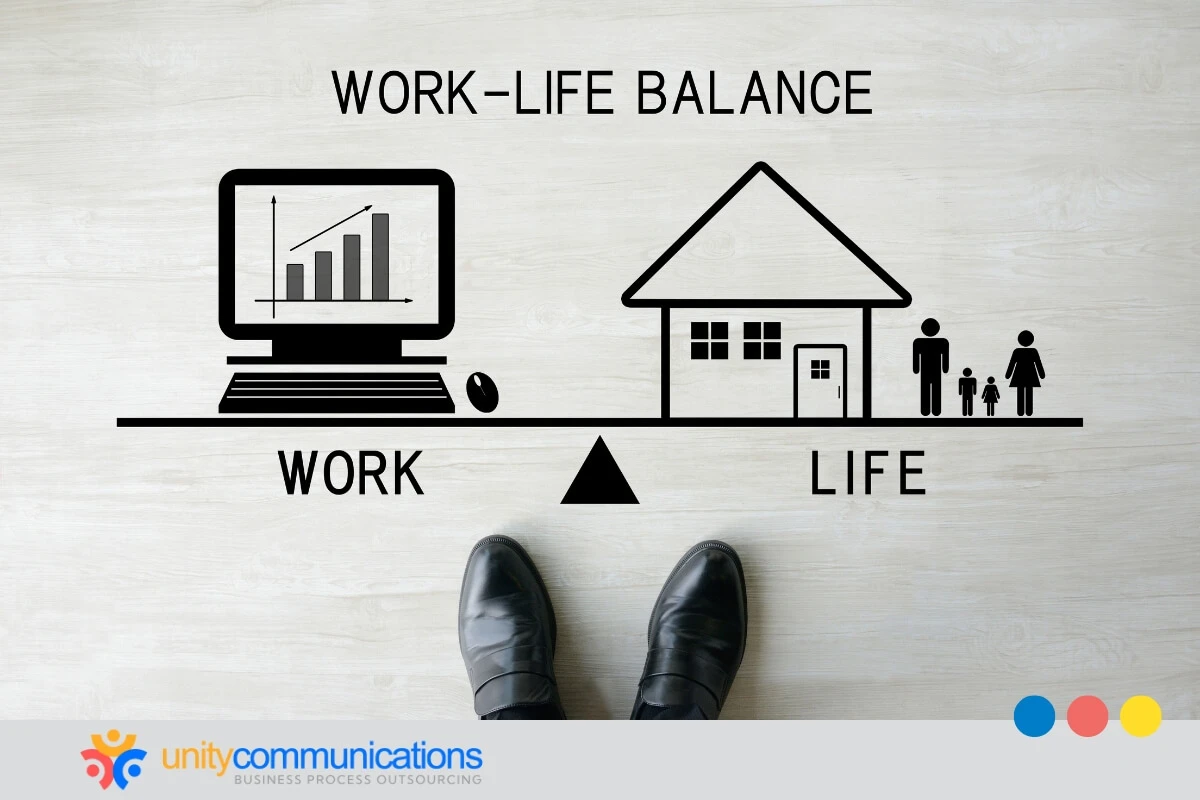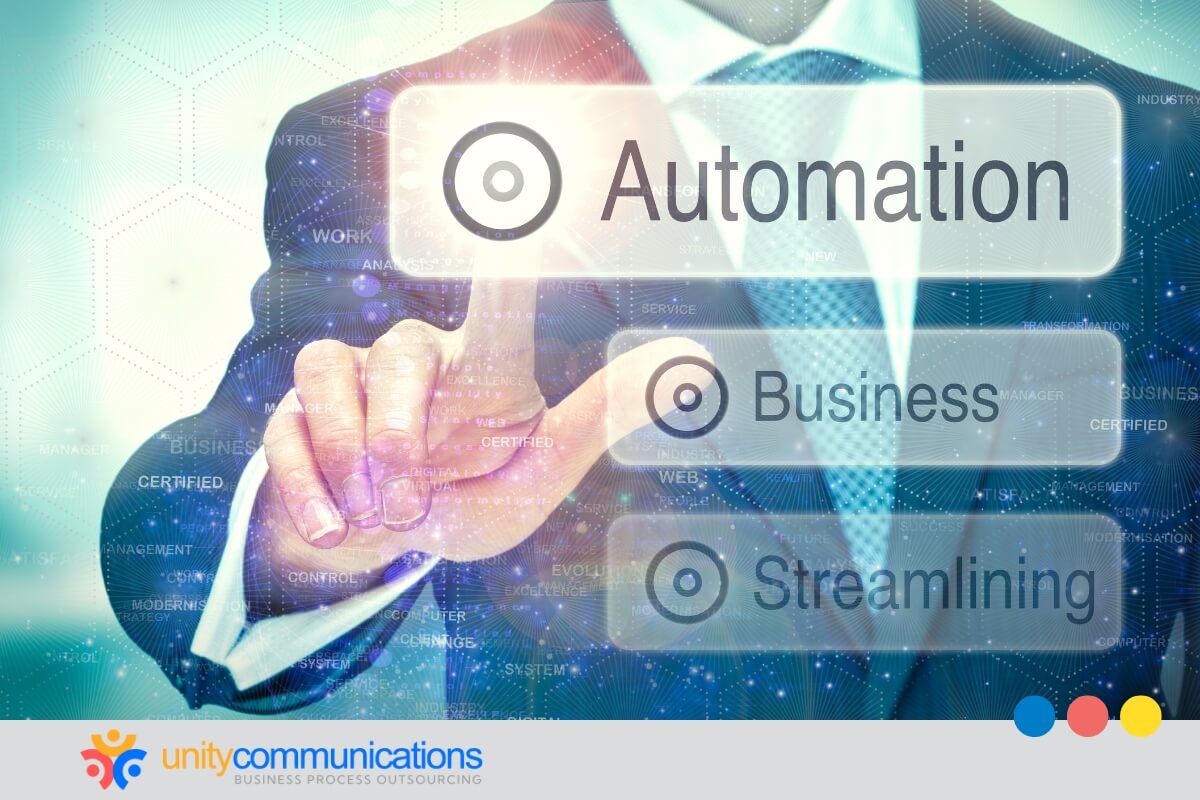IN THIS ARTICLE
Table of Contents
Managing a successful law firm can be time-consuming and overwhelming, no matter the dedication and effort you and your team invest.
However, you can address this problem more efficiently by implementing legal process outsourcing (LPO), a type of business process outsourcing (BPO). This strategy promises enhanced scalability for your practice.
This article explores the process of outsourcing legal services, its benefits, and industry trends. We also compile a list of factors to consider when choosing an outsourced legal service provider.
Why Law Firms Outsource

So, what is BPO in legal processes? LPO is when law firms and departments outsource legal tasks to external service providers, often in countries with lower wage ranges, to reduce costs, increase efficiency, and focus on their core competencies. This outsourcing model is a specialized version of BPO.
The worldwide LPO market was valued at $13.67 billion in 2022 and will continue to grow at a 31.4% compound annual growth rate (CAGR) from 2023 to 2030.
At its core, LPO is an easy way to enhance capacity and improve profitability. Here are the reasons law firms are turning to service providers and BPO organizations:
- Adaptable staffing solutions for your client cases. Third-party experts offer their services as needed, allowing your firm to access qualified legal assistance for various projects or cases.
- Flat-fee billing. Outsourcing enables you to enlist skilled lawyers for specific projects or entire cases. They charge a predetermined fee or implement blended fee caps for legal services.
- Work-life balance. Independent and small firms face increasing pressure to maintain constant productivity and stay profitable. Third-party lawyers provide additional support without the overhead costs associated with a full-time employee.
- Comprehensive legal services. Instead of referring cases outside your practice specialties to other firms, consider handling them in-house with the expertise of a contract attorney. These professionals allow your firm to provide a full range of services.
When to Consider Outsourcing for Your Law Firm
For those practicing law, comprehending and capitalizing on strengths is crucial for profitability. However, managing a law firm, akin to any business, entails numerous tasks requiring your attention.
This is where outsourcing legal work becomes valuable. LPO involves outsourcing specific legal services to third-party firms, attorneys, or paraprofessionals instead of relying solely on internal resources. Many qualified legal professionals and contract attorneys are available via this method.
If you are still uncertain about outsourcing legal services, take a moment to assess the health of your firm. Additional assistance might be necessary if you are encountering any of the following:
- Overwhelming caseloads: handling more cases than you can manage independently
- Deteriorating client experience: receiving complaints regarding invoice errors or misplaced documents
- Forgotten tasks: postponing tasks such as sending invoices, uploading client documents, or reminding clients to make payments
Common Outsourcing Solutions in Legal Services

Outsourcing can be applied in specific areas of legal services, including:
- Court appearances. Non-substantive court appearances can be time-consuming, affecting your billing. Appearance counsel can handle hearings for a flat fee, saving you valuable time.
- Case and written work. Utilize specialized legal outsourcing companies for case and written work. Experienced third-party lawyers are readily available, whether you need in-office or remote assistance. This flexibility allows you to find skilled legal professionals with just a click.
- E-discovery and document review. Numerous companies offer affordable scanning and coding services. Alternatively, you can outsource document review to companies with a pool of contract lawyers, often at a fraction of the cost of a full-time employee.
- Contract drafting. This commonly outsourced legal service is predicted to grow. Service providers can draft contracts tailored to specific obligations and rights, covering licensing, financing, and procurement.
- Globalization-driven work. This function includes support for litigation, overseas transactions, and regulatory matters. Outsourcing globalization-driven work to external lawyers ensures your in-house legal team stays informed of foreign legal developments and complies with regional customs.
- Litigation-related tasks. These tasks include data entry, document discovery, and legal research. While third-party law firms or e-discovery vendors can handle these tasks, automation using the right technology can be a cost-effective alternative to outsourcing.
You can delegate various tasks to a contract attorney or service provider. Outsourced legal services encompass a wide range of activities, such as:
- Summarizing cases referenced in an opposing party’s brief
- Conducting legal research and preparing memos
- Drafting motions and pleadings
- Managing discovery, including subpoenas, requests for proposals (RFPs), and requests for applications (RFAs)
- Handling discovery responses and preparing pleadings, such as motions to compel, quash, or protect
- Conducting document review
- Summarizing depositions
- Drafting legal documents such as leases, wills, trusts, powers of attorney, and agreements
- Writing legal articles
- Crafting demand letters and other correspondence
- Managing corporate documents such as operating agreements, by-laws, and corporate resolutions
Emerging Trends in Legal Service Outsourcing
Business Wire has reported significant growth in the LPO industry, with the number of providers increasing. Companies with staff in England, the United States, South America, the Philippines, and Canada frequently offer LPO services.
Outsourced legal services are predominantly process-oriented. Specialized LPO providers handle legal services requiring advanced analytical skills, such as patent application drafting and legal research, following client-provided training.
Regarding location, the same research shows that the onshore segment is projected to achieve a CAGR of over 34% from 2023 to 2030. This type of outsourcing is particularly attractive for companies wishing to collaborate with organizations within their own country.
Meanwhile, the patent support segment represented nearly 23% of revenue in 2022. This share can be attributed to organizations’ increasing awareness of hiring legal services to safeguard their technology and inventions.
As the industry expands, three noteworthy trends emerge in LPO.
Artificial Intelligence (AI) and Automation Solutions
The legal industry’s AI software market will reach $3.64 billion in 2029. Simplifying processes and optimizing workflows, especially in high-volume stages such as client intake, significantly impacts the success of law firms. Lawyers seeking to move beyond manual tasks find great utility in AI and automation software.
LPO vendors can streamline contract drafting, legal document assembly, and e-discovery activities using AI-driven automation. Systems powered by intelligent document automation can automatically extract pertinent information, fill in templates, and guarantee adherence to legal standards.
Adoption of Hybrid Outsourcing Arrangements
Some law firms are exploring a hybrid model that combines LPO and offshoring to find the most efficient approach to handling routine tasks.
This strategy allows firms to achieve round-the-clock efficiency by leveraging onshore operations with offshore outsourcing. Regardless of the time zone, in-house and third-party teams can complete tasks at any time of the day.
Surge in E-discovery
Recent amendments to the Federal Rules of Civil Procedure, which make electronically stored information such as emails, e-calendars, and voicemails discoverable on handheld devices in litigation, contribute to the growing market for e-discovery services.
As the demand for e-discovery services increases, more firms turn to the convenience and cost-effectiveness of LPO.
Technologies Used in Legal Process Outsourcing

As we can see from the examples above, AI-powered business technologies are set to transform the legal sector.
Simultaneously, legal practitioners worldwide are increasingly adopting cloud-based data storage due to its remote accessibility, automated features, and user-friendly interface. Corporate legal departments dealing with substantial business-critical data are transitioning from outdated corporate governance procedures and software to cloud-based technologies.
Here are other technological solutions outsourcing vendors use in legal services.
Legal Automation
Automation technology simplifies repetitive and routine tasks. Contemporary legal automation is categorized into no-code or low-code automation. Both offer time, cost, and resource savings. They empower processes with flexibility and scalability.
- No-code automation involves using digital applications without writing code, which is suitable for basic stand-alone applications.
- Low-code automation requires minimal coding and is ideal for intricate and customizable systems operating through variables and conditions, often integrated with other organizational systems.
Document or Contract Automation
Contract and document automation stand out among the notable developments in legal tech solutions. These tools are highly adaptable, integrable with other systems, and optimizable using both low-code and no-code automation.
Common applications of contract automation include non-disclosure agreements (NDAs), employment contracts, lease agreements, procurement contracts, engagement letters, and more.
Workflow Automation
Legal professionals utilize predefined, structured processes called legal workflows to receive, review, and complete tasks. Automated legal workflows leverage technology to streamline, structure, and expedite task execution, offering significant time savings, reduced errors, and enhanced departmental efficiency.
Examples of automated workflows are legal intake, law firm instruction, RFP processes, matter management, spend management, and regulatory and compliance workflows.
Client Portals and Collaboration Programs
In the evolving digital legal market, fostering seamless collaboration and communication between law firms and clients is essential for competitiveness.
The next generation of client portals goes beyond file sharing and one-way communication, incorporating real-time collaboration, project management, business intelligence reporting, and more. These advanced client portals enhance the client experience through intelligent intake forms and secure, integrated collaboration workspaces.
How to Choose a Legal Service Outsourcing Partner
As you seek the ideal LPO partner, reflect on the attributes that can contribute to your firm’s success. These are:
- Experience. Consider prospects’ experience in the industry, training background, and previous employers.
- Skill. Evaluate their capabilities, workload management skills, work priorities, and any specializations or certifications they possess.
- Familiarity with legal technology. Check for expertise in managing legal billing, invoicing, timekeeping, and task management using legal software.
Choose your top two or three preferred candidates, considering not only their history but also their potential.
Pose the following questions to potential providers to determine the best fit based on their responses:
- Where are you or your workers located?
- How do you train or vet your workers?
- What capabilities and features are included in your service?
- Does your solution integrate with my existing tools and systems?
- Do you own the technology powering your solution?
- Do you offer flexible plans or options?
- Do you have real people who provide ongoing support?
- How will you contribute to the growth of my business?
The Bottom Line

Outsourced legal services indicate a world that is becoming more interconnected and competitive. They help level the playing field for independent lawyers and small legal firms, offering them a distinct chance to innovate and position themselves for enduring success and efficiency.
Unity Communications is a one-stop service provider for all your legal process needs. Let’s connect to discuss how outsourced legal services can boost your operations!





